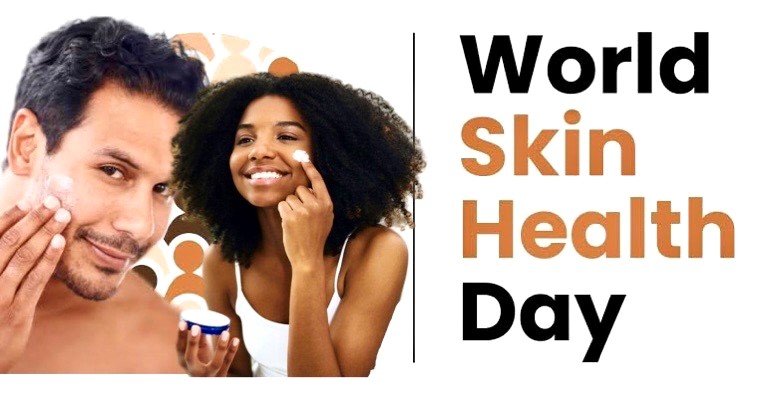Goa is abuzz with excitement as vintage bike and car owners, users, collectors and fans are decking […]

THE SECRETS TO CLEAR SKIN!
July 13- July 19 2024, MIND & BODY, HEART & SOUL July 12, 2024A World Skin Health Day Special!
In our ongoing efforts to enhance your health, we explore the intricate connection between skin health and overall wellness. On World Skin Health Day on July 8 we address some of the issues to do with skin health, Says Dr Amit Dias, “Glowing skin is a reflection of glowing health.” Here are his insightful observations covering the subjects of skin, skin color, sunscreen, acne and lots more.
An Q/A interview with Dr Amit Dias
Goan Observer: In today’s interview on World Skin Health Day, we would like to understand the secrets of skin health. Let’s start with trying to understand why skin is considered an important part of the body?
Dr Amit Dias: The skin is the largest organ of the human body, playing a crucial role in protecting us from external factors like micro-organisms, chemicals, and physical injuries. It also helps regulate body temperature, enables the sensation of touch, and synthesizes vitamin D when exposed to sunlight.
In addition, skin acts as a barrier to water loss, maintaining hydration in the body. We often do not realize the importance of our skin, if a major portion of our skin is burnt, we can lose our lives. Our skin is the most visible part of our body and forms a major part of our personality.
As we observe World Skin Health Day, we need to educate ourselves and others on how we should literally “save our skin.”
Q: Can you tell us some more facts about our skin?
A: Here are some more interesting facts about our skin:
The average adult has about 21 square feet of skin and weighs around 9 pounds.
The thinnest skin is found on the eyelids, while the thickest is on the soles of the feet.
Skin constantly renews itself, shedding about 30,000 to 40,000 dead skin cells every minute.
The skin contains up to 300 sweat glands per square inch.
Every month, you have a completely new layer of skin. Skin as you know, has various colors and tones, making us human beings unique.
Q: Skin color is also a cause of much racism in the world! What is the reason for the color of our skin color?
A: Racism based on skin color is a deeply ingrained issue that perpetuates inequality and discrimination. I would say – Different Shades, Equal Humanity — all shades are beautiful! Skin color is determined by the type and amount of melanin melanocytes produced in the epidermis. There are two main types of melanin: eumelanin (which is brown to black) and pheomelanin (which is red to yellow).
Melanin production is influenced by genetic factors, exposure to sunlight, hormonal changes and certain medical conditions.
Q: How can skin reflect medical conditions?
A: Skin often mirrors what’s happening inside the body. It is a visible indicator of various systemic diseases and a good clinician should not miss these signs. Changes in skin color, texture and the presence of lesions can all point to underlying health issues. Here are some common examples of medical conditions manifesting as skin signs.
Diabetes can cause acanthosis nigricans, which presents as dark, velvety patches in body folds and creases.
Psoriasis is associated with red, scaly plaques that can indicate an overactive immune response.
Jaundice manifests as a yellowing of the skin and eyes, indicating liver problems.
Lupus often manifests as a butterfly-shaped rash across the cheeks and nose.
Hypothyroidism may cause coarse, dry skin and hair.
Q: Good, hope everyone has made a note of that. Doctor, how can we work towards clear skin?
A: Here is a simple secret to “CLEAR SKIN”– I am making it easy to remember:
• C: Cleanse gently
• L: Limit sun exposure
• E: Exfoliate regularly (but not too often)
• A: Apply moisturizer
• R: Retinoids for anti-aging
• S: Sunscreen daily
• K: Keep hydrated
• I: Include a healthy balanced diet
• N: No smoking, regulate alcohol intake
Q: That’s easy-to-remember, can you elaborate on the tips?
A: The principle is to be gentle with your skin. Your grandmother would have handed down a lot of home remedies with aloe vera, turmeric, lemon, etc, to make your skin bloom, follow them.The problem arises when you use inappropriate artificial chemicals on your skin and damage it. Here are the general measures to be followed.
- Cleansing: Use a gentle cleanser to remove dirt and oil without stripping away natural moisture.
- Moisturizing: Keep the skin hydrated with a good moisturizer suitable for your skin type.
- Exfoliation: Sensitive skin may only need exfoliation once a week, while oily skin may benefit from more frequent exfoliation
- Sun Protection: Apply a broad-spectrum sunscreen with at least SPF 30 every day, even on cloudy days.
- Healthy Diet: Eat a balanced diet rich in vitamins, minerals and antioxidants.
- Hydration: Drink plenty of water to maintain skin hydration from the inside out.
- Avoid Smoking and Limit Alcohol: Both can prematurely age the skin and cause damage.
- Regular Check-ups: Visit a dermatologist regularly to monitor skin health and catch any issues early.
Q: Speaking of sun protection which sunscreen would you recommend?
A: There are several brands available in the market. Use a broad-spectrum sunscreen that protects against both UVA and UVB rays. UVA rays have a longer wavelength and are associated with skin aging and UVB rays are of shorter wavelength and are associated with skin burning. As I mentioned earlier, use a sunscreen with a SPF of at least 30. Choose a formula that suits your skin type — oil-free for oily skin, hydrating for dry skin and hypoallergenic for sensitive skin. Reapply frequently within two hours, and more frequently if swimming or sweating to get maximum effect.
Q: We see a lot of adolescents with acne. What exactly is it and how can one prevent and treat it?
A: Acne is a common skin condition that occurs when hair follicles become clogged with oil and dead skin cells. It can manifest as whiteheads, blackheads, pimples, or cysts.
Prevention and Treatment:
- Cleanse regularly: Use a gentle cleanser twice a day.
- Avoid harsh scrubbing: This can irritate the skin and worsen acne.
- Non-comedogenic products: Use skincare and makeup products that do not clog pores.
- Healthy diet: Limit sugary and high-glycemic foods, which may trigger acne.
- Medications: Over-the-counter treatments like benzoyl peroxide or salicylic acid, and prescription medications like topical retinoids or antibiotics.
- Professional help: consult your doctor or dermatologist for the right medication and more advanced help.
GO: what are the age-related changes in the skin? And what can we do about it?
A: As we age, there are several age-related changes.
• Wrinkles and fine lines: Due to decreased collagen and elastin.
• Dryness: Less oil production and slower cell turnover.
• Thinning skin: This makes the skin more fragile and susceptible to bruising.
• Age spots: Increased pigmentation due to prolonged sun exposure.
• Loss of fat: Reduces the fullness and plumpness of the skin.
We need to follow the same guidelines that I mentioned earlier, our life and lifestyle during our youth will reflect on our skin as we age.
• Dry skin: Especially common in winter.
• Seborrheic dermatitis: A condition causing oily, irritated skin.
• Malassezia yeast: A fungus that lives on the scalp and can trigger dandruff in some people.
• Sensitivity to hair care products: Contact dermatitis from certain ingredients.
Here are various ways one can treat it:
- Medicated shampoos: We get anti-dandruff shampoos in the market that contain ingredients like zinc pyrithione, selenium sulfide, ketoconazole, or salicylic acid.
- Regular washing: Keeps the scalp clean and reduces oil buildup.
- Moisturize: Conditioners can help with scalp dryness.
- Manage stress: Stress can worsen and exacerbate dandruff.
- Healthy diet: A diet rich in zinc, B vitamins, and healthy fats can support scalp health.
Q: What is your message on World Skin Day?
A: Skin health is for all… you need to take care of your skin. Following simple tips for CLEAR SKIN can help us make health a way of life. Let your skin glow, to reflect the true you. Read and share this information and let everyone glow.
















